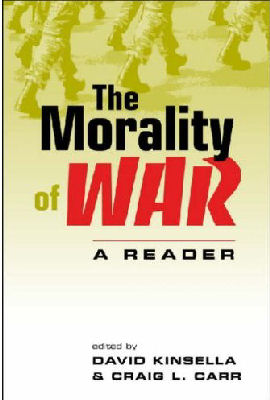
|
Posted September 12, 2007
Book: The Morality of War: A Reader Edited by David Kinsella and Craig L. Carr Lynne Rienner Publishers. Boulder. 2007. Pp. 415 An Excerpt from the Introduction:
An Excerpt from the Book: If realism as a theory of international relations is a relative newcomer on the intellectual stage, the prudential and self-interested behavior of states is hardly news. Yet rarely has it been stated and advocated with the clarity and power found in the section of Thucydide’s Peloponnesian War, entitled “The Talks at Melos.” Thucydides, a former Athenian commander, chronicled the events of the Athenian war against Sparta in an effort to explain how and why Athens managed to grasp defeat from the jaws of victory. The talks at Melos involved the efforts of the Athenian to enlist Melian support for their war effort. If the Melians refused to support the Athenian effort, the Athenians threatened to destroy Melos. The Athenians were vastly more powerful than the Melians and supporting their threat to be credible thought that the Melians had no alternative but to acquiesce to their demands. The Melian response, however, contended (among other things) that Athens had no right to implicate her in the Athenian fight with Sparta. Claims of right, however, carried no weight whatsoever with the Athenians, who saw the issue in decidedly realistic terms. Might is not presumed to make right from the Athenian view, but it does permit the mighty to get what they want — or else. And in the end, this is all that mattered to them. Questions of right were simply beside the point, and when the Melians refused to succumb to Athenian pressure, the Athenians had no qualms in bringing about the destruction of Melos. What has all this to do with the morality of war? The most straightforward answer to this question is to note that realists are not strong advocates of just war theory. They do not think states will necessarily adhere to the morality of war, and thus they do not think this morality should be used as a guide to a state’s foreign policy unless appearing to do so can advance a state’s power in the international setting. But realism might be overly cynical about the motives of state authorities and about the anarchical character of the international setting. It is in a state’s best interest to get along with others, particularly in an era when the military capacity of the more powerful states enables them to devastate their foes so completely. And getting along is enhanced by endorsing and accepting clear rules that define permissible and impermissible behavior in the relations of states. The morality of warfare and the development of an international law of war works in this direction, and this is reason for all states of the world to take it seriously. It is perhaps unnecessary to think that the rules and principles constitutive of the morality of war have some objective or immutable truth about them. What matters is that they work to promote and safeguard a peaceful coexistence among the states of the world, and thus to transform an otherwise anarchical environment into a more orderly and domesticated one. Table of Contents: Part I Historical and philosophical approaches to the morality of war 2. Realism 3. Pacifism 4. Just war theory Part II Resort to War (Jus ad bellum) 5. Aggression and self-defense 6. Preemption and prevention 7. Terrorism 8. Intervention Part III Conduct of War (Jus in bello) 9. Combatant rights 10. Noncombatant rights 11. Blockades and sanctions 12. Technology and war Part IV War crimes and judgement (jus post bellum) 13. War and crime 14. Judgement and enforcement |
|
